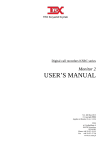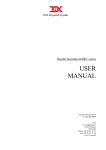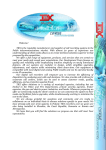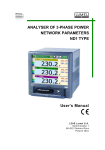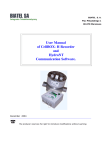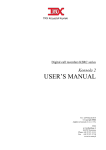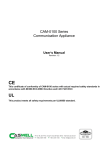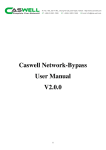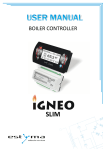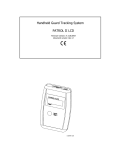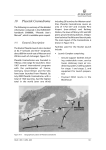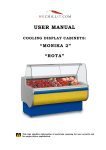Download Automat 2 - user manual
Transcript
TRX Krzysztof Kryński Digital call recorders KSRC series Automat 2 USER’S MANUAL Ver. 1.6 May 2013 © Copyright TRX Applies to Automat 2 ver. 2.2.x TRX ul. Garibaldiego 4 04-078 Warszawa POLAND phone +48 22 871 33 33 fax +48 22 871 57 30 www.trx.com.pl Automat 2 – User ’s manual Information about changes: All specifications and figures contained herein are subject to change without notice. The latest version of this document may be found on our webpage: www.trx.com.pl. Trademark notes: Windows® is the property of Microsoft Corporation. © Copyright TRX page. 2 of 38 Table Of Contents TABLE OF CONTENTS: 1: THE BASICS............................................................................................................................... 5 1.1 1.1.1 1.1.2 1.1.3 1.1.4 1.1.5 2: DEFINITIONS ...................................................................................................................... 5 DESCRIPTION OF SECURITY LEVELS .................................................................................... 5 ARCHIVING RULE ................................................................................................................ 6 START TIME ......................................................................................................................... 6 ARCHIVING POINTER ........................................................................................................... 6 ARCHIVE FILES.................................................................................................................... 6 INSTALLATION ........................................................................................................................ 7 2.1 2.1.1 2.1.2 2.1.3 2.1.4 2.1.5 2.2 2.3 2.3.1 2.3.2 3: THE INSTALLATION SOURCE............................................................................................. 7 LAUNCHING THE INSTALLER............................................................................................... 7 LANGUAGE PREFERENCE .................................................................................................... 8 CHOICE OF THE INSTALLATION DIRECTORY ....................................................................... 8 THE REGISTRATION WINDOW .............................................................................................. 8 INSTALLATION PROCESS ..................................................................................................... 9 CHANGE OF THE INSTALLATION .................................................................................... 10 UNINSTALLATION ............................................................................................................ 11 WINDOWS XP ................................................................................................................... 11 WINDOWS VISTA/7 ........................................................................................................... 11 BRIEF EXAMPLE OF ARCHIVING .................................................................................... 12 3.1 3.2 3.3 4: DEFAULT RULES FILE LOCATION ................................................................................... 12 ADDING A ROLE ............................................................................................................... 13 LAUNCHING ARCHIVE PROCESS ..................................................................................... 16 DESCRIPTION OF AUTOMAT 2 FUNCTIONS ................................................................. 17 4.1 4.1.1 4.1.1.1 4.1.2 4.1.2.1 4.1.2.2 4.1.2.3 4.2 4.2.1 4.2.2 4.2.3 4.3 4.4 4.4.1 4.4.2 4.5 4.5.1 4.5.2 ADDING THE ARCHIVE RULES ......................................................................................... 17 RECORDER AUTHORIZATION ............................................................................................. 18 Name manager ................................................................................................................... 18 THE CHANNEL SELECTION ................................................................................................ 19 Cycling criteria settings ..................................................................................................... 20 Archive parameters ............................................................................................................ 21 Recorder info ..................................................................................................................... 24 CHANGING THE ARCHIVE RULES .................................................................................... 25 EDITION............................................................................................................................. 25 REMOVING ........................................................................................................................ 25 CREATING A COPY OF AN EXISTING RULE ......................................................................... 26 ARCHIVING POINTER....................................................................................................... 26 MANUAL CONTROL ARCHIVING PROCESS ..................................................................... 26 START IMMEDIATELY ........................................................................................................ 26 CANCEL ARCHIVING.......................................................................................................... 27 ARCHIVING RULE FILES .................................................................................................. 27 IMPORT OF RULES ............................................................................................................. 27 EXPORT OF RULES ............................................................................................................. 28 © Copyright TRX pager 3 of 38 Automat 2 – User ’s manual 4.6 4.6.1 4.6.2 4.6.2.1 4.6.2.2 4.6.3 4.6.4 4.7 4.7.1 4.7.2 4.7.3 SETTINGS AUTOMAT 2 APPLICATION ............................................................................... 28 GENERAL SETTINGS .......................................................................................................... 29 EMAIL - NOTIFICATIONS .................................................................................................... 30 Notification wizard ............................................................................................................ 31 Manual configuration......................................................................................................... 32 SETTING THE LANGUAGE VERSION ................................................................................... 36 HIDING THE APPLICATION WINDOW.................................................................................. 36 LOGS OF THE PROGRAM.................................................................................................. 36 EVENT LOGS WINDOW ....................................................................................................... 36 LOG FILE ........................................................................................................................... 37 EXAMPLES OF MESSAGES .................................................................................................. 37 © Copyright TRX page. 4 of 38 Chapter 1: The basics 1: The basics In TRX products the mechanism of automatic protection the most recent recordings has been used. Recorders will automatically create space for new recordings by erasing the oldest ones when the disk is close to full capacity. Therefore recordings that you need to be kept longer should be archived, i.e. periodic copied from the recorder to other media (eg CD/DVD). The Automat 2 application was developed for customers for whom archiving feature implemented in free of charge Konsola 2 application is insufficient. The main advantage of this program is possibility to define schedules for archiving session. Sessions will be run automatically on a particular cyclical time defined by the user, on condition that the program will be started at this time. Automat 2 is a paid application, lawful using this program requires holding the license validated by TRX. However free testing the application with key 00000000-000 is possible. The trial version should be removed from your computer after 30 days from the date of installation. This application can be launched on PC stations under Microsoft Windows XP, Vista, 7 or 8 - operating system. It is possible to create the archiving rules independently for few recorders. 1.1 Definitions In the next section is a description of some terms used in the User's Guide of Automat 2. Getting acquainted with following definitions will help in further work with the program. 1.1.1 Description of security levels Recorders are equipped with different security systems, providing protection of all recorded information from unauthorized access. The security level system is one of them. A number in range from 0 up to 255 is assigned to every user, channel and recording on the recorder. The default security level is set to 0 (the lowest level). © Copyright TRX pager 5 of 38 Automat 2 – User ’s manual Users with administrator privileges have level number 255 (the greatest one) assigned. Security level numbers are defined by administrator. The security level for a recording is initially set the same as the security level of channel it comes from. Each user has granted access to recordings with either equal or lower security levels comparing to the security level of user. Each user is able to change recording’s security level, but only up to the owned security level. In such a manner, he limits access to recordings for other users with lower security level. 1.1.2 Archiving rule Archiving rules allow you to define the source data (being copied from the recorder), the output data (stored to archive files), and the schedule managing archive process. Access to recorder’s archives is created based on privileges the user specified for current rule and is limited by mechanism of security levels. The resulting data can be saved to a file with the declared capacity without or with audio compression. The application allows you to define the cyclic performance of the archives, and set the time of starting the data copying session. The Automat 2 is able to handle almost unlimited number of rules, which can affect more than one recorder. 1.1.3 Start time The starting point indicates the date and time of the first recordings to be archived within the configured rules. This marker is a constant and cannot be edited. 1.1.4 Archiving pointer Archiving indicator indicates the date and time of which (in the context of the rule) will be archived recordings in the next archiving session. For new rule archiving pointer assumes the value of Start time parameter. After every cycle of the archiving this parameter is set to the beginning of the last recording time increased by one second. 1.1.5 Archive files Archive files contain recordings which were taken downloaded by Automat 2 program from the recorder during the backup. The format of archive files data enables you to read the archive contents only with the Konsola 2 application. These files can additionally be protected with a password given in the rule of archiving. © Copyright TRX page. 6 of 38 Chapter 2: Installation 2: Installation Next section of this chapter provides a brief description of Automat 2 installation process. The application is working correctly under Windows XP (Service Pack 3), Windows Vista, Windows 7 and Windows 8. 2.1 The installation source Automat 2 installer is supplied as an executable file (*.exe). Current and previous versions of the application are available on website: www.trx.com.pl (Download Center). Automat 2 is a paid application, lawful using this program requires holding the license validated by TRX. However free testing the application is possible. The trial version should be removed from your computer after 30 days from the date of installation. The full version of the program requires the key code received when purchasing the license. Trial version (if it was installed) you must first uninstall and then reinstall the program by entering into the field received the serial number. 2.1.1 Launching the installer To run the program installer you should double-click executable file named TRX_Automat2_2.x.x.exe. The installer is checking whether the operating system environment meets the necessary requirements of the program. If you detect any deficiencies, inform the user to complete them. The next steps of the installer are available when you press OK or Next. It is possible to stop the installation at any time by clicking on the Cancel button. Notice: Before running the installer it is recommended to uninstall any previous version of Automat 2 application. © Copyright TRX pager 7 of 38 Automat 2 – User ’s manual 2.1.2 Language preference Right after setup has been launched, language selection window will appear. The default language is Polish, and optional English and Slovak. User’s choice will affect both setup dialog windows and Automat 2 interface language. Please note, that interface language can be changed after program has been installed. 2.1.3 Choice of the installation directory At this stage, you must choose the directory in which Automat 2 will be installed. It is recommended to leave the default directory. After you specify the destination folder, the installer allows you to select the location for application shortcuts: Desktop, Start Menu Programs folder and Startup folder. 2.1.4 The registration window In one of the first steps in installation of Automat 2 the registration screen will appear. You should complete the following fields: - User Name - Organization - Serial Number Leaving the default key 00000000-000 allows you to use the program for a period of 30 days. After this time Automat 2 stops working. © Copyright TRX page. 8 of 38 Chapter 2: Installation To use the version without restrictions you must first uninstall the trial version and then re-install the program by entering into the field received a serial number. Notice: In order to preserve archiving rules created in the trial version it should be before uninstalling save to file. 2.1.5 Installation process Begin Installation … window means that installer has all the necessary information needed to install the program. To continue, press the Install button. You can verify the installation parameters using the Back button or cancel the installation process. © Copyright TRX pager 9 of 38 Automat 2 – User ’s manual In the next window of installation process, you should select one of the two types of log file location: shared for all users, or separate for each Windows account. By default, the first option is selected. The legend describe shows the location of the log file path for all possible combinations. For example common log file in Windows 7 operating system will be saved in location: C:\ProgramData\TRX\Automat 2\AutomatLog.alf. 2.2 Change of the installation If the current version of Automat 2 program is already installed, the user can change the components, repair or remove files from your computer hard drive. © Copyright TRX page. 10 of 38 Chapter 2: Installation 2.3 Uninstallation To uninstall Automat 2 from your system, use the uninstall launcher utility or standard Windows tools. Depending on the system, they differ slightly from each other. 2.3.1 Windows XP The installed software can be removed by: - choose a shortcut Uninstall (Star Menu → Programs → TRX → Automat 2), - choose a shortcut TRX Automat 2 in Add / Remove Programs (menu Start → Settings → Control panel → Add / Remove Programs), - run the Automat 2 installer program and select Remove. 2.3.2 Windows Vista/7 The installed software can be removed by: - choose a shortcut Uninstall (Start Menu → All programs → TRX → Automat 2), - choose a shortcut TRX Automat 2 in Programs or Programs and functions (menu Start → Control panel → Programs or Programs and functions), - run the Automat 2 installer program and select Remove. Notice: Automat 2 installer creates many register entries, so it is not recommended to remove this program manually (by simple deletion of program files). Notice: All items such as shortcuts or configure files added manually by the user after the installation must also be removed manually too. © Copyright TRX pager 11 of 38 Automat 2 – User ’s manual 3: Brief example of archiving This chapter describes the basic operations necessary to create a rule for archive and start the process of archiving all recordings stored on recorder’s HDD. The chapter is intended to quickly familiarize with the configuration and handling of recorder at primary level. The more complex aspects of configuration and precise description of Automat 2 functionality was presented in the next chapter: Description of Automat 2 functions. 3.1 Default rules file location Before you start working with the program you should enter location where the default rules file will be saved. If default rules file is not defined the appropriate message appears. In order to determine location of the file, select Options position from the Settings menu. In the Program parameters window, on General settings tab, you should specify the file location path. © Copyright TRX page. 12 of 38 Chapter 3: Brief example of archiving After selection a destination folder, you should type a file name and choose the Open button. The indicated path will be copied to the appropriate dialog box. 3.2 Adding a role To create archive rule you should select Add archiving rule from the context menu of the program main window. © Copyright TRX pager 13 of 38 Automat 2 – User ’s manual In Recorder authorization window you should enter device IP address as well as username and password for recorder account having granted access for archiving calls on all required acoustic channels. If authentication data for default recorder user has not been changed, the username and password is respectively: admin and admin. In the case of building archives from all channels of the recorder, the most convenient is to use All button in The channel selection window. As a result all checkbox near the channel names should change appearance from to . The next stage allows you to specify timing parameters for archiving session: Periodicity – determines how often subsequent session of the archiving process will be performed. It can remain the default setting: Everyday. Start time – determines date of the oldest recordings intended for archiving. © Copyright TRX page. 14 of 38 Chapter 3: Brief example of archiving Start rule at ... – determines the time at which the process of creating archive will be started.It can be set to a default time: 00:00:00. In this example, the first archiving session will be started manually, while subsequent will be started automatically every day at midnight. In the next dialog window, you should specify the path to the files with archived recordings. It can be any location providing enough free space. Other items for Archive parameters window can be set to default - specifying the following attributes: - backup file size of is 650MB, - not used any compression for audio samples, - all recordings from selected time interval will be archived (regardless of call duration). At the last stage of archive role wizard you should define a unique name for current backup policy, and check the Activate rule checkbox. © Copyright TRX pager 15 of 38 Automat 2 – User ’s manual 3.3 Launching archive process Shortly after archive role creator is completed, the new policy is displayed in the main window of Automat 2. New line contains information about name, status (active or inactive), and description the most important parameters, configured during creating the rule. To manually start the archiving process you should select the rule, and then click on Start immediately command from Archiving menu. Archiving progress is indicated by means two bars under Completion status column and appropriate messages in log window. © Copyright TRX page. 16 of 38 Chapter 4: Description of Automat 2 functions 4: Description of Automat 2 functions This chapter contains detailed description of all features available in Automat 2 application. Description of functions is given in order of appearance in the main menu. During work with the program sequence of operations performed is more akin to that described in the previous chapter: Brief example of archiving. 4.1 Adding the archive rules The option is available from the Archiving menu, main window context menu or F5 keyboard shortcut. Adding a new rule for archiving refers to definition the following mandatory parameters: - recorder IP address, - physical and/or virtual channels, - date of beginning the first archived record, - date and time of starting and the cyclical nature of backup sessions repetition, - location of the archive file, - name and maximum size of created files, - compression type of the audio stream, - the access level for archived recordings, - rule’s identification name. © Copyright TRX pager 17 of 38 Automat 2 – User ’s manual 4.1.1 Recorder authorization The window allows you to enter parameters of the recorder to be a source of archived recordings. The name of recorder user account (entered in the field Login) determines the level of access to his channels. Recorder – specifies the detail of archived recorder. Enter the recorder IP address - parameter can be entered manually or selected from a drop-down list (if is not empty). Login and Password – data for recorder account authentication. Type the user data, which has permission to archiving the required channels. Remember last login and password – selecting this option will store last authorization data during creating next archiving rules. This option is useful if you created a few rules for the same recorder, or supported recorders have the same data for authentication. Name manager – opens a dialog box for some features described in subsection 4.1.1.1. If you enter the correct authorization data and the recorder is available, the wizard proceeds to the next stage, otherwise error screen appears. In case of error as above check whether the authorization has been entered correctly and the network connection to recorder is working properly. This can be done using another TRX application (eg Konsola 2) or ping command. 4.1.1.1 Name manager Name manager window allows you to manage recorder parameters, i.e. automatically search for all available recorders. Recorder name field allows the use of "user-friendly" text descriptions displayed next to the device's IP address. © Copyright TRX page. 18 of 38 Chapter 4: Description of Automat 2 functions Add – allows you to add an entry (IP address and optionally name) to the list of displayed recorders. Edit – allows you to change the parameters of the selected row, mainly name of the recorder (port number change is not recommended). Delete – used to delete selected row. Search for recorders – allow for detecting all recorders are able to establish communication with Automat 2. If on completion of searching the window of the manager is empty, it means that no recorder is available. 4.1.2 The channel selection This window allows you to select channels to be a source of archived recordings. Choosing the channel is indicated by the checkbox by its name from to . Depending on the permission level granted to individual recorder users, a list of available channels may be full or limited. Channels, for which the user does not have permission to archive, are displayed in the list grayed out font, without checkbox in the beginning of the line. © Copyright TRX pager 19 of 38 Automat 2 – User ’s manual The buttons on the right side of window are used for selecting the appropriate group of channels: All - selects all available channels in the list, None - deselects all channels, Invert - reverses the state of channel activity. The ones that were previously selected are deselected and vice versa. If you do not select at least one of the channels, there an error window appears. 4.1.2.1 Cycling criteria settings Time settings window allows you to set three time parameters for the currently configured rule. Start time - indicates the date and time of the first recordings to be archived under the first session for the given rule. Its value is fixed for the rule - it can not be edited later. Start rule at ... - determines start time of the first and consecutive sessions of the archive process. Periodicity - defines the periodicity of repeating backup session. It is possible to adjust the parameter with twenty-four hour raster. You can choose one of the three options: Everyday, Days of week and Every month. Depending on the selected parameter Time settings window has a slightly different form. For Everyday option the window has no additional controls. The backup will run every day at the time specified in Start rule at... field. For two remaining options (Days of week and Every month) the window contains additional fields, allowing clarify time settings for the rule. © Copyright TRX page. 20 of 38 Chapter 4: Description of Automat 2 functions For Days of week option there is a necessary to define which days of the week (Monday ... Sunday) and order of weeks (1 to 52) should run backup sessions. In the example shown above, the backup session will run on Monday, Wednesday, Friday and Sunday, in which the third week of the year. This means that during the first week recording will be archived four times, when during next two weeks - not once. If you leave empty checkboxes for all days of the week, the error alert will appear. In case of choosing Every month option you should specify a day of the month and at least one month in which the archiving process should be started. The day of the week can be entered in one of two forms: - the number identifying order of the days in the month (eg. 20-th), - name of the weekday and order of weeks in the month (eg. 3-rd Tuesday). If you leave empty checkboxes for all month of the year, the error window will appear. 4.1.2.2 Archive parameters At this stage of configuration it is possible to determine parameters for the archive files, and any additional criteria that should be met. © Copyright TRX pager 21 of 38 Automat 2 – User ’s manual Archive location – refers to the directory location for created archives. If the field is left blank the program will display an error message. Archive file name prefix – specifies the prefix common for all files created under the rule, prefix helps identification of the files, especially when in the same directory are stored backups for several different recorders. This field can not be empty, it can not also contain special characters: \ / : * ? „ ” < > |. Append to archive file name – list that allows user to select additional information attached to the archive file name: - Only archivization start date, - Only archivization start time, - Archivization start date and time, - Only dates of first and last record, - Only times of first and last records in archive file, - Dates and times of first and last records in archive file. File size – list allows you to specify the maximum size of a single archive file, includes capacity corresponding to the most popular storage medium: 100 MB (ZIP) 200 MB (ZIP) 650 MB (CD-R/RW) 700 MB (CD-R/RW) 700 MB (CD-R/RW) 800 MB (CD-R/RW) The program also allows you to enter theoretically any values in the range from 1 B to 2 GB. However, the structure of the archive file (the default setting) will not allow you to store the content of incomplete call. One second of uncompressed audio takes about 8 kB. Only full archive files – enabling this option causes that will not be created archive files smaller than the value specified in the parameter File size. Recordings that do not fit in the last full backup file will be saved in the next session (if the total size for new data exceeds the value of the parameter File size). This mechanism is illustrated in the diagram below. © Copyright TRX page. 22 of 38 Chapter 4: Description of Automat 2 functions Compression – parameter determines whether the audio data will be saved in the native G.711 A-law, or in one of the available compression standards: ADPCM 2, ADPCM 4, Speex 8.0 kbps. Selecting one of the compression methods allows you to place a larger number of records in a single file archive, but will prolong the archiving process. The quality of the archived call may also be slightly lower. Level – makes that archiving the calls is dependent on their level of security (access). The default parameter value 255 means that will be archived all (available to the given user) calls from everyone (intended for archiving) channels. Changing the parameter to other value causes, that calls having security level higher than the entered threshold will not be archived. Ignore shorter than – option allows you to specify the minimum duration of the recordings, which will be saved in the created archive. Ignore longer than – option allows you to specify the maximum duration of recordings that are saved in the created archive. Archive password – access password for playback recording from the archive, blocking access to the files for unauthorized persons © Copyright TRX pager 23 of 38 Automat 2 – User ’s manual Write display data – selecting this option enables adding information about display content on recorded digital phones (as long as it is available). Storing the displays can significantly extend duration of the backup session. Advanced – button opens the window where you can enter extra time-range settings. It allows you to limit backup only to calls carried on during working hours of the company (eg. Mon. - Fri, 8:00 ... 16:00). Day of week – any day of the week can be selected multiple times. Register records – forbidding or permission for archiving calls from specified time scope: inside range – calls will be recorded outside range – calls will not be recorded Time from / Time to – beginning / end hours of the range for the selected day. Notice: The forbidding ranges override the permission ranges. 4.1.2.3 Recorder info In the last stage of the configuration should be given a unique name for the created rule and set the flag activity. The name for each rule must be unique, otherwise error window pops up. © Copyright TRX page. 24 of 38 Chapter 4: Description of Automat 2 functions Clicking on checkbox next to Activate rule causes the rule will be started automatically after meeting time conditions. Archiving rule can be activated at the stage of its creation, or in any other (subsequent) time. The entry with created rule appears in the main window. 4.2 Changing the archive rules The rules created with archiving can be freely edited or deleted. Automat 2 also allows you to create subsequent rules based on copies already existing ones. 4.2.1 Edition This option is available from Archiving menu, main window context menu or F6 keyboard shortcut. Edition covers all parameters of an existing rule except Start time option: (Time settings tab). The procedure for editing rules is analogous to the operations performed at the stage of adding them 4.2.2 Removing This option is available from Archiving menu, main window context menu or F7 keyboard shortcut. When you delete selected rule a window appears like below. According to the suggestion, if the erased rule was stored in default rules file and you are still going to use this file - press No button. © Copyright TRX pager 25 of 38 Automat 2 – User ’s manual 4.2.3 Creating a copy of an existing rule Automat 2 application allows you to create subsequent rules based on copies already existing ones. This is convenient if you created a few rules similar to each other. Instead of creating each archive rule from the beginning, simply create a copy of an existing, and then modify it accordingly using the tools from Edit archiving rule menu. 4.3 Archiving pointer The Archiving pointer is pointing at the date and time of the recording, from which archiving data in the next backup session will start. For the new rules Archiving pointer assumes a value of Start time parameter. After each backup cycle, this parameter is set to the start time of the last recording increased by 1 second. As a result, subsequent start-up rule will start archiving recordings from the time, when the previous session ended data collection. In this way, the application ensures the continuity of archived data. Automat 2 enables both view and modifying the archiving pointer for the selected rule. The access to the archiving pointer is possible from Archiving menu, main window context menu or F8 keyboard shortcut. 4.4 Manual control archiving process Automat 2 allows you to manually control the archiving process. You can start or stop the selected rules. 4.4.1 Start immediately This option is available from Archiving menu, main window context menu or F9 keyboard shortcut. You can start the process of archiving based on the selected rule immediately, regardless of activity status (active / inactive) or cycling criteria settings. © Copyright TRX page. 26 of 38 Chapter 4: Description of Automat 2 functions 4.4.2 Cancel archiving This option is available from Archiving menu, main window context menu or F10 keyboard shortcut The function allows for termination of running backup session. User can choose the way in which the policy will be stopped. Stop archiving immediately – forces an immediate interrupt the archiving process. The data currently being written to the file will be lost. Fill current archive file and finish archiving – backup interruption will take place upon completion of writing to the current file. The data, in contrast to the previous option, will be saved in the specified location. Set archiving pointer to last record in last full and correct archive file – sets the archiving pointer at the end of the last correctly archived record (similarly as during normal operation of the program). Set archiving pointer as it was before archiving – sets the archiving pointer to his value before running an interrupted backup. 4.5 Archiving rule files Archiving rules already created in Automat 2 application are stored only in your computer's memory. To make the information stored in the archive rules were available after closing the program, it must be saved to a file. Specific format for archiving rule file (*.arf) makes that it can be read out exclusively by the Automat 2 application. The application during every startup loads configuration stored in the default rules file. If the file is empty, damaged, or the program can not find it - the window with list of rules is empty. In this case, it is necessary to either load the settings from the backup file, or create them again. 4.5.1 Import of rules Option Load rules from file allows you to load to Automat 2 application the configuration of rules previously saved in backup file. Notice: Import rules from the file causes a loss of the current configuration (displayed in the main window). Current data will be removed from memory and replaced by the rules read from the file. © Copyright TRX pager 27 of 38 Automat 2 – User ’s manual After choosing this option an opened standard Windows window allows you to load a policy file (*.arf). Notice: Import a set of rules from the specified file does not mean that the same set of rules will be loaded the next time you start the program. The program always loads the default rules file. Its location can be read or changed in Settings/Options menu. 4.5.2 Export of rules The Save rules to file options allows you to save the current set of archiving rules to an external file. This file allows you to save the current settings and restore them in the future, as well as copy the configuration to another computer. Due to the fact that the archiving rules contain information about recorder username and password, the copy of the rules are saved to the *.arf files in an encrypted format. The data contained in these files can only be read using the Automat 2 application. 4.6 Settings Automat 2 application The Settings option is used to change the configuration settings, such as: - default location path of the archiving rules file, - default location path of the program log file, - automatic starting the application at the start of operating systems, - e-mail notifications, - user interface language, etc.. © Copyright TRX page. 28 of 38 Chapter 4: Description of Automat 2 functions 4.6.1 General settings You can make changes of program parameters using two tabs: General Settings and Notifications. Default rules file – indicates the path of the default file containing the rules, which is loaded into memory when the application is started. Right after installation the field is empty. Default logs file – indicates the path of the default file to which the program messages are stored. Initial path is configured during Automat 2 installation process. Start when Windows start – enabling this option causes the program launch automatically when Windows is started. Start of the application is taking place already after initiation of the desktop environment, and therefore requires that a user earlier logs on the system (unless the automatic login option is enabled). Save program windows sizes and positions – enabling this option causes the program saves the layout (width) of columns displayed in main window. Turn optimization on – enabling this option causes, the program during the archiving uses additional CPU instructions. In most cases, it accelerates the archiving process. Allow splitting single record between archive files – by default, calls while writing to the archive files are not divided into fragments. Each archive file contains integer number of recordings, which causes that the individual archives have slightly different sizes. Enabling recordings sharing option aligns the sizes of the archive files, however playback the calls, that have been fragmented (stored in two archive files), requires access to both archive files. Verbose logging – enabling this option causes writing to the log file extended information about the process of archiving. Due to the large increase in the volume of logs do not recommend enabling this mode during normal operation of the program. Information recorded in the verbose logging can be useful in emergency situations when the backup process does not work properly and when you need to determine the cause of abnormal behavior of the program. © Copyright TRX pager 29 of 38 Automat 2 – User ’s manual 4.6.2 Email - notifications The Automat 2 allows you to send selected, archiving related reports to email addresses defined recipients. Notifications are created for all active archiving rules. In order to use the function of sending events by e-mail, it is first necessary to set up an e-mail sender account. For this purpose, click Sender account setup button. The sender account configuration comes down to giving data of the outgoing mail server (SMTP) settings, and giving username and password for this account. The Send mail (test) button allows user to check the correctness of the settings. In case of ignore the stage of SMTP server configuration of the SMTP server will display the error. In the next step of the configuration user should define: - kind/type of archiving related event (left column), - e-mail address for one or more recipients (center column), - e-mail subject and body (right column). © Copyright TRX page. 30 of 38 Chapter 4: Description of Automat 2 functions These parameters can be configured manually, or by using the wizard (using the Add new with wizard button). 4.6.2.1 Notification wizard In the first step of the e-mail notification wizard, user shall choose one from the list of available events. The events for which have already been created e-mail notification, do not appear on the list. In the next step of the wizard, specify the recipient information (name and e-mail). © Copyright TRX pager 31 of 38 Automat 2 – User ’s manual The wizard allows you to create only one recipient for each alarm notification. Successive e-mail addresses (if necessary) can be added only by manually editing the event. The next window allows you to enter the subject and the body of e-mail, which will be sent to recipients. When you click on the Finish button, the program automatically creates the assignment: archiving related event, recipient of e-mail and message body of the notification. 4.6.2.2 Manual configuration Manual configuration allows you to configure e-mail notification more widely. This allows among other to add multiple recipients for one alarm event. Here is an example of adding three new recipients for the notification created by the wizard in section 4.6.2.1 Adding new recipients to the created event – an example In order to add the new e-mail recipient, you should select from the context menu for center column – the Add notification recipients option. © Copyright TRX page. 32 of 38 Chapter 4: Description of Automat 2 functions In the next step, in the Choose recipients window, the user should choose from the context menu Add new recipient option. The next window allows you to enter the name and e-mail address for the new recipient. This procedure should be repeated as many times as new customers you intend to add. After adding all recipients, user should select desired entries and click OK button. E-mail addresses selected in the previous window, you will see on the list. © Copyright TRX pager 33 of 38 Automat 2 – User ’s manual The next step is to associate each new recipient with the body message. To do this, select e-mail address and choose Select the body of the notification option. The program enables choosing from list the message already assigned to the recipient user1 (select the row and click OK) or create a new one (Add message body button). In this example, the first option is used, ie for all recipients have been assigned the same contents of the e-mail body. In the last step of the configuration user should activate new recipients by activation the (checkbox) next to their name. If you try to activate the receiver which has not been allocated to any e-mail message appears in the error window. © Copyright TRX page. 34 of 38 Chapter 4: Description of Automat 2 functions Other features available for manual configuration For each column of the Configuration of the email messages window a context menu is available. Add new notification – using this option you can select the types of events whose occurrence has cause to send email notifications. You can select one of the seven types of events. Delete notification – option causes removing the selected notification. Add notification recipients – option enables adding and assignment (for selected events) the new recipients. Activate / deactivate all notification – option will automatically activate / deactivate all notifications visible in the Event column. Recipients manager – with this option the managing of e-mail addresses of notification recipients is possible. Entries can be added, deleted or edited. Add notification recipients – option enables adding and assignment (for selected events) the new recipients. Delete notification recipients – option causes removing the selected recipients for the chosen notification. Select the body of the notification – with this option the assignment of subject and e-mail body contents for selected recipient is possible. Edit the body of the notification – option enables changing the subject or contents body of the selected e-mail. Activate / deactivate all recipients – option will automatically activate / deactivate all addresses visible in the Recipients list column. Notification body manager – with this option managing the list of notifications is possible. Entries can be added, deleted or edited. Edit the body of the notification – option enables changing the subject or contents body of the selected e-mail. © Copyright TRX pager 35 of 38 Automat 2 – User ’s manual 4.6.3 Setting the language version Automat 2 allows you to select one of one of the following language versions for user interface: - Czech - Polish - English - Slovak 4.6.4 Hiding the application window When you select this option and minimize the Automat 2 window, on the Windows taskbar does not appear button that informs about the running application. Only small icon in the System Tray (next to the clock) is visible. 4.7 Logs of the program Logs of the Automat 2 program contain information about operation of the application and performed operations. The messages relate in particular to such information as: errors detected during the data download, date and time of creation subsequent archive files, modification archiving rules. Messages are displayed in the program log window and also are saved to the log file located in directory specified in Default logs file field (menu Settings/Options). 4.7.1 Event logs window Logs are displayed in a form of the table about three columns: First column - describes the date of occurrence of the events described, the accuracy of a single second (your computer local time). Second column - describes the source that generated the event. In most cases, the source of the event will be one of the loaded archiving rules. The events that relate to the entire program (eg start an application) are described by Automat 2 label. Third column - contains a short text description of the event.. In order to easier identify the type of information which is displayed each log line is marked with an appropriate icon. - Application started - Application closed - Remarks: icon placed on events such as: configuration change (addition, removing, the edition of rules), errors during executing the archiving rules (no connection with the recorder, an empty list of recordings). © Copyright TRX page. 36 of 38 Chapter 4: Description of Automat 2 functions - Information: icon placed on events such as: information about the program (default path to the log file, default path to the rules file), information about the archiving rules (archiving start time, time range of archived recordings, recorder IP address). 4.7.2 Log file Messages generated by the program, in addition to display on the screen are saved to an external file. This allows you to create documentation for stages to create the backup, arisen errors, modifying the set of rules, etc. Although the format of the log file is not "pure" text format, you can read them using a text editor (such as WordPad). 4.7.3 Examples of messages The following list includes the most common error messages occurring in the logs of Automat 2 application. Application started. Application closed. Using this logs file: <file name>. Rules loaded from default file: <file name>. Rules loaded from file manually: <file name>. Current rules set saved to file: <file name>. Connection to recorder <IP address> failed. Communication service <service name>. Error while downloading channels list from recorder: <IP address>. Error while downloading records list from recorder: <IP address>. Records list from the given time range on recorder <IP address> is empty. Archiving started. Archiving finished. Code: <status code>. Number of records for archiving: <quantity>. Number of archive files: <quantity>. Creating archive file started: <name>. Error while saving records to archive file: <file name>. Creating archive file completed successfully: <file name>. Not enough records to continue archiving. Rule has the 'Only full files' parameter set. Downloading channels list from recorder: <IP address> started. Downloading channels list from recorder completed successfully. Preparing records list from recorder: <IP address> started Preparing records list completed successfully. There is not enough free disk space to start archiving. Downloading records list from recorder: <IP address> canceled Archiving canceled: <date time> © Copyright TRX pager 37 of 38 Automat 2 – User ’s manual Creating archive file: <file name> canceled Unfinished archive file: <file name> deleted In rule <rule name> archiving pointer was changed from <old timestamp> to <new timestamp>. Creating report file <file name> completed successfully. Fatal error #1. Report this situation to TRX. Error data: <data> Fatal error #2. Report this situation to TRX. Error data: <data> TRX ul. Garibaldiego 4 04-078 Warszawa POLAND tel. +48 22 871 33 33 fax +48 22 871 57 30 [email protected] © Copyright TRX TRX Serwis ul. Międzyborska 48 04-041 Warszawa POLAND tel. +48 22 870 63 33 tel. +48 22 871 33 34 [email protected] page. 38 of 38






































